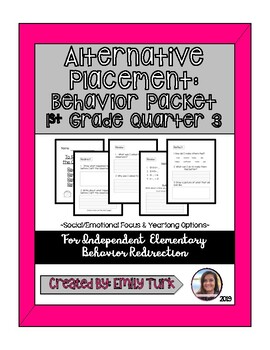Behavior Packet-Quarter 3
Lanyards and Lessons
140 Followers
Grade Levels
K - 4th
Resource Type
Standards
CCSSK.OA.A.2
CCSSK.OA.A.5
CCSS1.OA.A.2
CCSS1.OA.B.4
CCSS1.OA.C.6
Formats Included
- PDF
Pages
11 pages
Lanyards and Lessons
140 Followers
Description
Behavior Packet for Alternative Placement--can be used in the Buddy Room, Behavior Room, or the Office for independent student work. This packet covers redirection of behavior, review of expectations and academic work, reflection over affect on others, and return to the room, along with accountability on the student and supervising alternate placement teacher to complete the packet accurately. Encourage students to take time to remove themselves from upsetting situations in a way that reevaluates what actions should be taken when feeling overwhelmed.
Total Pages
11 pages
Answer Key
N/A
Teaching Duration
45 minutes
Report this resource to TPT
Reported resources will be reviewed by our team. Report this resource to let us know if this resource violates TPT’s content guidelines.
Standards
to see state-specific standards (only available in the US).
CCSSK.OA.A.2
Solve addition and subtraction word problems, and add and subtract within 10, e.g., by using objects or drawings to represent the problem.
CCSSK.OA.A.5
Fluently add and subtract within 5.
CCSS1.OA.A.2
Solve word problems that call for addition of three whole numbers whose sum is less than or equal to 20, e.g., by using objects, drawings, and equations with a symbol for the unknown number to represent the problem.
CCSS1.OA.B.4
Understand subtraction as an unknown-addend problem. For example, subtract 10 – 8 by finding the number that makes 10 when added to 8.
CCSS1.OA.C.6
Add and subtract within 20, demonstrating fluency for addition and subtraction within 10. Use strategies such as counting on; making ten (e.g., 8 + 6 = 8 + 2 + 4 = 10 + 4 = 14); decomposing a number leading to a ten (e.g., 13 - 4 = 13 - 3 - 1 = 10 - 1 = 9); using the relationship between addition and subtraction (e.g., knowing that 8 + 4 = 12, one knows 12 - 8 = 4); and creating equivalent but easier or known sums (e.g., adding 6 + 7 by creating the known equivalent 6 + 6 + 1 = 12 + 1 = 13).





